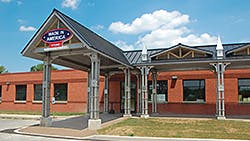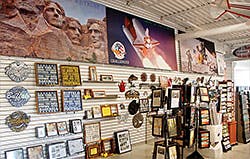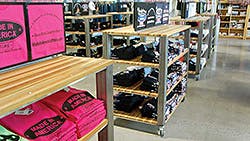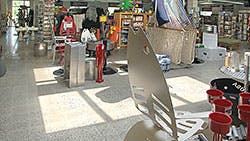The Great Recession, circa 2009, was no picnic for anyone. Companies large and small suffered in what was the most severe economic downturn in North America since the 1930s.
But for most truck equipment dealers and small manufacturers, the battle for business was fought on local soil against local competitors. They were losing sales because the market was shrinking, not because of an influx of foreign competition.
For General Welding & Fabricating, the story was different. The company was facing a soft market for truck equipment and for the light-duty trailers that it manufactured. Parts sales were down, too.
But the biggest blow came to the company’s custom fabrication business. Some of its custom work was unrelated to trucks and trailers. It even included fabricating steel structures that artists envision. And at the depth of the domestic downturn, General Welding lost its most lucrative contract to offshore competitors who convinced General Welding’s long-term customer that they could offer them a much lower price. When that business went away, President Mark Andol had no choice but to close the dedicated plant that had supplied that product.
“We had four locations at one point, and we closed two of them during the downturn,” Andol says. “We also closed a 60,000-sq-ft facility where we produced large custom weldments. We were losing business that we had developed in the oil and gas industry, in mining, and in the military. Some of this was business that suddenly wasn’t out there, but it really hurt when we lost existing business to China.”
What was the company’s response? The motto at General Welding & Fabricating is “You dream it, we build it.” When the company lost its bread-and-butter contract to a Chinese competitor, Andol had a dream of his own. He would promote American businesses by opening a retail store. He called it the Made in America store.
But initial response was less than enthusiastic.
“This idea won’t go,” Andol’s father told him. “We are a welding shop—that’s all we are. Who opens a business like this?”
In reality, General Welding was more than a welding shop. The company had been selling truck equipment for years and had developed a decent retail parts business that provided some degree of experience with selling products to the public.
“Our parts department was a template,” Andol says. “We always tried to stock parts that were made in America. The first thing we did was check the source of the parts we were selling. We discovered that between 60 and 80% were made here.
“Second, our parts showroom was already selling a lot of different parts—for snowplows, salters, light-duty trailers. We were experienced in selling face-to-face to retail customers. Plus, we know how to manage inventories. It doesn’t matter if the product you are selling is a cutting edge for a snowplow or a kitchen knife. You have to buy it, sell it, and manage the inventory.
But in another sense, his father was right.
“Five years ago, we couldn’t find many products that were made entirely in America,” he says.
The restrictions Mark Andol put on the products the store would sell were unusual. Those restrictions included:
• Everything, including the packaging, had to be produced in the United States.
• The quality of the product had to be high.
• Proceeds from the manufacture of the product had to feed American families.
Setting up shop
The product line may have been limited initially, but Andol found a location right away—an empty building that had housed a local Ford dealership.
“I asked the guy who owned the building if he would rent it to me,” Andol says. “He asked me what I wanted to do with it, and I told him. He replied, ‘The world is full of crazy people. Go for it.’”
What happened next took everyone by surprise. The local newspaper in Buffalo wrote a small story about the new Made in America Store. The Associated Press picked up the story, and then the phone started ringing with invitations to do interviews on national media outlets in Russia, Korea, Japan, and Germany, along with multiple media outlets based in America.
“I have appeared on Fox and on ABC World News Tonight four times each,” Andol says. “Since Made in America Store opened in 2010, we have had more than 500 documented interviews. And most of those interviews have ended with an expression of thanks to us for the store and what it represents.”
Another surprise: customers arriving in tour buses, frequently on their way to visit Niagara Falls.
“The first bus showed up in 2010. A second came all the way from Iowa,” Andol says. “The buses just come. In our six years of business, we have had 525 to stop and unload here, including 110 already this year.”
Bigger reason to stop
The tour buses now have a bigger reason to stop. Andol earlier this year moved the operation out of the old Ford dealership and into a new building built across the road from General Welding & Fabricating. The new building is designed specifically to house the flagship Made in America Store. And, yes, this one has a special entrance for tour buses.
Andol now has seven Made in America Stores in western New York. In addition, he is developing a ‘store-in-a-store’ concept” in which Made in America Store merchandise is sold inside retail outlets owned by others.
In May the business announced a partnership with Kinney Drugs in which the Made in America Store will be the chain’s wholesale provider of made in America products throughout its stores in New York and Vermont. And in September, the company was in the process of opening a Made in America Store section within the gift shop of Batavia Downs Casino an hour east of Buffalo.
The company also is using e-commerce. The approach involves multiple websites, including Made in America’s own online presence (www.madeinamericastore.com) and another on Amazon.
Plenty to sell
The Made in America Store now offers more than 7,000 products.
“We went from hundreds of SKUs in the General Welding & Fabricating system to more than 30,000 with the Made in America Store,” Andol says. “Thirty thousand SKUs for 7,000 products may sound like a lot, but every shirt has to have a separate SKU for every size. It wasn’t nearly that many when we first started the Made in America Store, but we are always adding products to our lineup.”
The stores have grown to the point that they need a distribution center to make sure that individual stores are not out of stock or have too much on hand. The distribution center, located within the new flagship store, makes that happen.
To manage the Made in America Store inventory, the store uses software developed for sports arenas.
“These are places where suddenly 80,000 customers can be in a ‘store,’” Andol says. “The system was difficult for us to set up. We had a ton of data to enter. Our team wanted to kill me for choosing it, but it paid off once we put it in. The reports it generates are great, and they give you the information you need to adjust to changes in the business. It has shown to be an outstanding point of sale system.”
Plenty still happening
The Made in America Store has drawn national attention. Meanwhile, General Welding & Fabricating Inc is once again on strong footing. The company’s parts department is running six days a week, with 24-hour emergency plow repair service available.
“This is the time of year that things really get busy for us,” Andol says. “Guys are getting their plows out of the weeds and making sure their equipment is ready for the winter. We are selling a lot of cutting edges, trip springs, and replacement pins for every brand on the market. Salter parts are picking up, too.”
While parts for snow and ice control equipment are picking up as winter approaches, sales of other parts have been steady all year long.
“We used to change out our showroom displays,” Andol says. “We would go heavy with plows this time of year and play up other products in the spring. But trailer parts seem to be selling well all the time. So even this time of year, we have plenty of trailer parts on display. A lot of that has to do with the fact that we manufacture trailers. We are a trailer OEM in the back of the building and a retail parts outlet in the front.”
General Welding looks to Redneck Trailer Supplies and Buyers Products for much of what it sells up front.
“Lights are huge for us,” Andol says. “Lights for snowplows. Lights for construction sites. Lights for firemen and for jobsites. For trailers, we sell a lot of wheels, tires, brakes, and jacks.”
General Welding also has had success selling welding supplies to its customers.
“A lot of our customers are landscapers and independent contractors who want to do their own repairs whenever they can,” Andol says. “That includes welding, so we sell them what they need—products like helmets, gloves, wire brushes in addition to actual welding supplies.”
Mutually beneficial
Just as the General Welding parts department helped prepare the company for the launch of the Made in America Store, so too has this venture into consumer retailing helped General Welding be a better truck equipment distributor.
“The Made in America Store has caused us to streamline everything we do to help the customer,” Andol says. “It has taken things to another level. As a result of what we have learned running the Made in America Store, we have improved our ordering and have learned technology that we otherwise would have not thought about. We have honed our people skills and the way we deal with our parts customers. It was a win-win for us.”
For more information
check out Made in America stores
About the Author
Bruce Sauer
Editor
Bruce Sauer has been writing about the truck trailer, truck body and truck equipment industries since joining Trailer/Body Builders as an associate editor in 1974. During his career at Trailer/Body Builders, he has served as the magazine's managing editor and executive editor before being named editor of the magazine in 1999. He holds a Bachelor of Journalism degree from the University of Texas at Austin.







